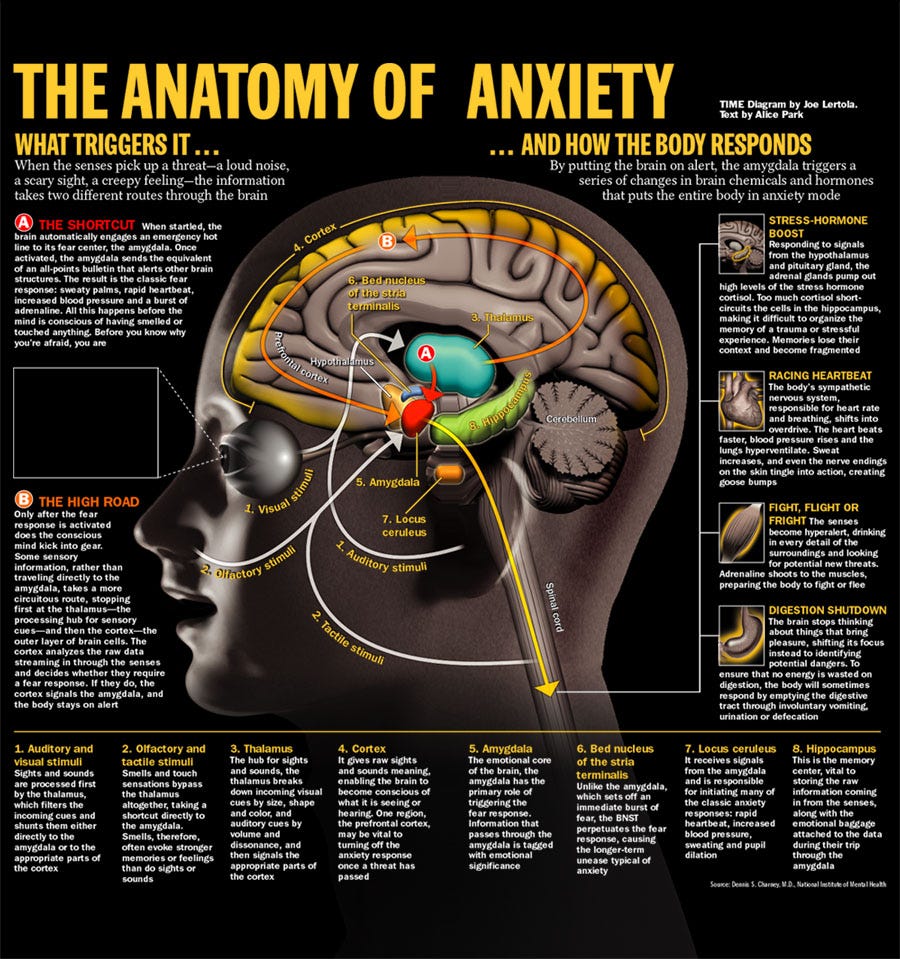Fear & Anxiety 🙀
Now that we have understood stress, let us go ahead and understand how we respond to stress.
Anxiety is our body’s natural response to stress. Anxiety is an apprehension about what’s to come. Now let’s distinguish fear and anxiety a little more.
We all have experienced both fear and anxiety in our lives. Fear is an immediate response to a specific threatening stimulus. Anxiety, on the other hand, is less intense but more sustained response to anxiety-inducing sources that may be known. For example, you may be anxious about the possibility of failing an exam, while you may experience fear if you facing a tough paper in front of you right now. Fear is about the now and anxiety is about the future. That is the most spiritual definition I could give on this account. LOL 😝
It’s normal to feel anxious about things like a new place, a new job, a keynote address or taking an exam etc. This type of anxiety is unpleasant, but it keeps our system alert. Anxiety comes and goes, but does not interfere with everyday life. When it interferes with everyday life, it becomes an anxiety disorder.
Persistent, excessive, unrealistic worry about everyday things is anxiety disorder
Basically you are a WORRIER. You worry all the time about everything 🤕 The anxiety disorders comes in many flavours like below (ref: healthline.com):
panic disorder: experiencing recurring panic attacks at unexpected times. A person with panic disorder may live in fear of the next panic attack.
phobia: excessive fear of a specific object, situation, or activity.
social anxiety disorder: extreme fear of being judged by others in social situations.
obsessive-compulsive disorder: recurring irrational thoughts that lead you to perform specific, repeated behaviours.
separation anxiety disorder: fear of being away from home or loved ones.
illness anxiety disorder: anxiety about your health (formerly called hypochondria).
post-traumatic stress disorder (PTSD): anxiety following a traumatic event.
Brain under anxiety
Let’s understand what happens to our brain under anxiety.
Like there are dedicated regions for vision (occipital lobe) and hearing (temporal lobe), there are specific regions dedicated to our emotions as well.
Limbic system is a complex set of structures in the brain (including hippocampus, amygdala, Hypothalamus and thalamus). This circuit handles most of our emotional processing. The pre frontal cortex (PFC) integrates the emotions into our decision making. This is why our logic (cognitive brain) and emotion (emotional brain) don’t go hand in hand as they are two different brain regions 🙃
Under anxiety, this limbic system undergoes changes. fMRI and PET scans show that there is more activity than usual in the limbic system. The amygdala (the fear center of the brain) gets hyperactive. Sometimes the size of amygdala itself increases. The constant chatter in the fear network is noticed.
Feeling anxious all the time is not a great feeling. You may have difficulty sleeping and you might not be on top shape to do everyday things well. You may also notice that you are palpitating at all times (increased heart rate), restlessness, breathing from the chest (rapidly) etc. There is no one standard test for diagnosis but a combination of tests done.
Read more about diagnosis here: Anxiety Diagnosis
Strategies to combat Anxiety
If the disorder is out of control, the two standard ways of dealing with it is
Use of medication (eg: antidepressants)
Therapy. Cognitive behaviour therapy helps in many patients.
eg: One of the therapy methods is to repeatedly expose the patient to the situation. The repeated exposures help. I can’t handle trypophobia. I can’t even see a cut lemon for that matter. Repeated exposure has helped and calmed me down over a period of time.
A combination of two is what is suggested.
If the disorder is nascent and is in control, then you can try the following
Getting enough sleep and rest everyday.
Meditating everyday.
Staying active and exercising.
Eating a healthy diet.
A good social circle. Meet friends. Laugh out loud. Talk your heart out.
Avoid nervous stimulants like alcohol, nicotine, caffeine etc
By now, you would have noticed that treatment plans are the same irrespective of the mental disorder.
Eat well, rest well, sleep well, move well.
The standard formula works. You don’t have to come here only through a disorder. You can make your daily routines in such a way that you keep you mind and body healthy. Prevention is far better than cure. Parts are not available for replacement 🤷♀️ Take care.
My 2 cents: Sense has helped more than any therapy out there. I am not saying medication is not needed but being sensible will avoid you getting to that point.
🥂to limbic system!

Credit:The Anatomy of Anxiety
Yo! Thanks for reading. Means a lot to me as attention is the hardest currency 🙏
If someone in your circle will benefit from this series, please pass them the details and ask them to subscribe here
If you would like to connect with the human behind the series, you can find me on Twitter and LinkedIn



